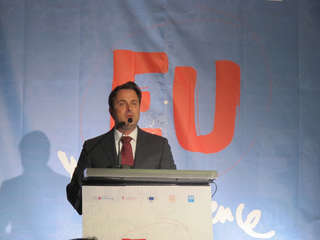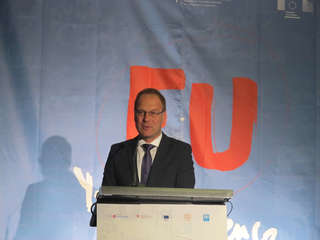
In his opening speech on the future of Europe and young people in Europe, the Prime Minister began by talking about the situation of "millions of people whose future is in danger", stressing that Europe is currently facing "the most dramatic" refugee crisis since the end of World War II. Calling for more solidarity between European countries and also with third countries, the Prime Minister stated that intervention in Syria might be necessary, but would require an international mandate. But there is also another possibility according to Xavier Bettel to prevent war and misery: more opportunities must be provided for people in these areas, and this can be done in particular through development aid with regard to which Luxembourg contributes 1% of its GNI.
To guarantee the future of Europe, Xavier Bettel stressed the importance of "giving young people good starting conditions in life". "We need active citizens who participate and are interested in their own futures and in the development of society", he said, referring to Luxembourg's initiatives in this field which include the creation of a centre for political education, which will be operational within a year, or the proposal of the Luxembourg Government to lower the voting age to 16 rejected in a referendum on 7 June 2015. "You have a place within society and democracy and your voice must be heard", said the Prime Minister to young Europeans. "The future has already begun and it is for you to decide how it will look like", he concluded.
Tibor Navracsics intends to deepen the structured dialogue

"We cannot afford to leave them behind as they are the future of Europe", he said, calling for the promotion of social inclusion, active citizenship and the participation of young people in democratic life. In particular, the Commissioner called for the deepening of the structured dialogue in which 40,000 young people currently participate. He believes that this tool should be representative of all young people from all backgrounds. In this context, the Commissioner announced the creation of "open and interactive" online spaces where young people can debate what is important to them.
A scientific study on the political participation of young people
The psychologist Katrin Hillebrand then presented a scientific study by different researchers from the University of Luxembourg and the Berlin School of Economics and Law (Hochschule für Wirtschaft und Recht) on political activism and self-conception of leftist youth ("Politisches Engagement und Selbstverständnis linksaffiner Jugendlicher"). Conducted among 35 young activists in 30 German cities, this study aims to analyse the emergence and development of political involvement among young people, focusing on the experiences and influences (family, school, etc.) of these young people.
The study revealed that many young people are not satisfied with current policy and the majority of them want more opportunities to make their voices heard. Their political involvement has often been influenced by family tradition (imitating parents or even opposing them) and the opportunity to participate in school life from an early age.

